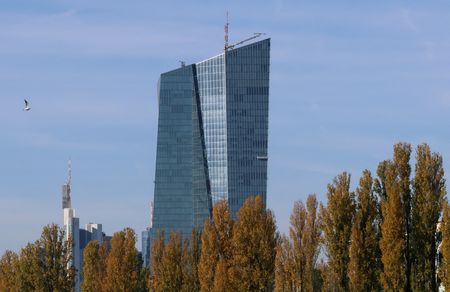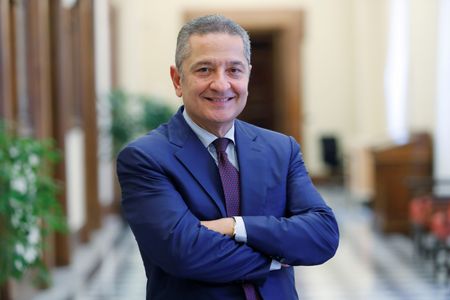By Marc Jones
LONDON (Reuters) – The European Central Bank’s sharp increase in borrowing costs has yet to be fully felt by the economy, two top European Central Bank policymakers said on Thursday, saying future moves should depend on how the data evolves.
Locked in a fight against inflation, the ECB has embarked on its steepest ever streak of interest rate hikes, which is set to continue next month and likely even after.
Yet the euro zone’s economy is holding up better than the ECB and many others had expected and measures of underlying inflation are refusing to budge.
The ECB’s Chief Economist Philip Lane and fellow board member Fabio Panetta said the central bank’s actions had yet to work their way through the economy and respectively called for “an open mind” and a “measured approach” to future moves.
“Most of the effects of our tightening are still ahead of us,” Panetta told an event in London. “This means, for example, that the current adjustment in the credit market…will likely compress consumption and investment in the coming months.”
He estimated that headline inflation in the euro zone may fall below 3% by the end of the year if the drop in energy prices is sustained — all the way down from 8.5% last month.
Lane later said ECB tightening has lowered inflation by around 1.2 percentage points this year 2023 and by 1.8 percentage points in 2024, but “much of the effect was “still in the pipeline”.
He listed a range of reasons why the impact of the ECB’s policy may be delayed, from high household savings to a greater proportion of fixed-rate mortgages than at the time of the last tightening cycle.
The ECB raised rates by a historically large 50 basis points earlier this month and pre-announced another increase of the same size for March 16.
Panetta, Italy’s appointee on the ECB’s board, called for smaller steps after March.
“By smoothing our policy rate hikes – that is, moving in small steps – we can ensure that we calibrate both elements more precisely in the light of the incoming information and our reaction function,” he said.
The comments put him at odds with some of his colleagues north of the Alps, such as the Netherlands’ Klaas Knot and the Bundesbank’s Joachim Nagel, who clamoured for more, big hikes.
Financial markets expect the ECB to increase the rate it pays on bank deposits to at least 3.5% by the summer, from 2.5% currently.
On top of raising rates and phasing out cheap loans to banks, the ECB has stopped replacing some of the bonds that mature from its 5-trillion-euro ($5.34 trillion) portfolio, amassed during eight years of quantitative easing.
Lane said that cutting those holdings by half a trillion over three years would cut inflation by just 0.15 percentage points and growth by 0.2 percentage points.
($1 = 0.9365 euros)
(Reporting By Marc Jones; Writing by Francesco Canepa in Frankfurt; editing by Balazs Koranyi and Sharon Singleton)


